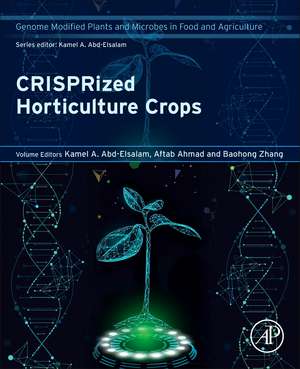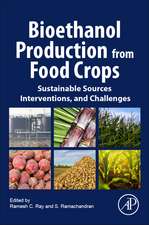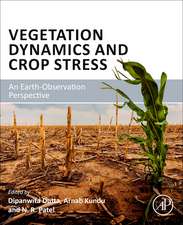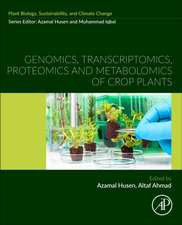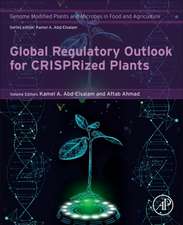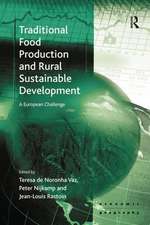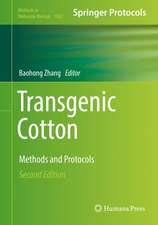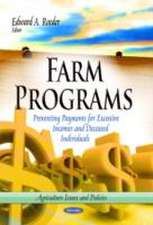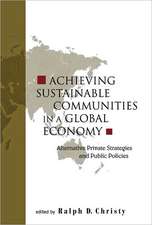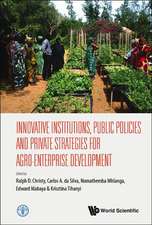CRISPRized Horticulture Crops: Genome Modified Plants and Microbes in Food and Agriculture
Editat de Kamel A Abd-Elsalam, Aftab Ahmad, Baohong Zhangen Limba Engleză Paperback – 21 mar 2024
Horticultural crops, including fruit, vegetable and ornamental plants are an important component of agriculture production systems and play an important role in sustaining human life.
- Reviews CRISPR for editing horticultural crops
- Discusses vector transformation methods, epigenome, deep learning, synthetic biology and precision breeding
- Includes bioinformatics and large-scale databases
- Contributes engineering approaches for crop improvement programs
Preț: 1204.56 lei
Preț vechi: 1568.76 lei
-23% Nou
Puncte Express: 1807
Preț estimativ în valută:
230.57€ • 242.23$ • 193.77£
230.57€ • 242.23$ • 193.77£
Carte tipărită la comandă
Livrare economică 04-18 martie
Preluare comenzi: 021 569.72.76
Specificații
ISBN-13: 9780443132292
ISBN-10: 0443132291
Pagini: 552
Dimensiuni: 216 x 276 x 29 mm
Greutate: 1.54 kg
Editura: ELSEVIER SCIENCE
ISBN-10: 0443132291
Pagini: 552
Dimensiuni: 216 x 276 x 29 mm
Greutate: 1.54 kg
Editura: ELSEVIER SCIENCE
Public țintă
Researchers, academics and advanced students in plant science, biology, plant science, microbiology, plant physiology, biotechnologyCuprins
Part 1: The CRISPR/Cas toolkit for Horticultural Crops
1. Horticultural Crops: Genomic Approaches: A note from Editors
2. Evolution of genome editing technologies
3. CRISPR / Cas: Effectors, mechanism, and classification
4. Bioinformatics tools and databases in genome editing for plants
5. Genome editing reagents and their delivery tools
6. CRISPR Techniques and their applications in plants
7. Base editing and Prime Editing in Horticulture Crops: Potential Applications, Challenges and Prospects
8. Multiplex Genome Editing in plants through CRISPR/Cas
9. CRISPR Edited Crops: The Future of Food and environment Sustainability
Part 2: CRISPR Mediated Genome Editing in Horticultural Crops
10. The CRISPRized Horticultural Crops: How they can transform our food supply
11. Precision breeding techniques for horticultural crops
12. Deep learning for genomics and epi-genomics in horticulture crops improvement
13. Transformation methods in horticulture crops and DNA free genome editing in plants
14. CRISPR vegetables: Challenges and opportunities
15. CRISPR–Cas9-mediated genome editing in tomato, and Potato
16. A CRISPR/Cas Based Improvement of Root and Tuber crops
17. Improvement of ornamental plants through CRISPR/Cas
18. CRISPR approaches for synthetic biology and metabolic engineering in vegetables and fruits
19. CRISPR Cas systems for the improvement of Solanaceous vegetable crops
20. Engineering biotic stress resistance in horticultural plants through CRISPR/Cas
21. Genome editing for abiotic stress resistance in horticultural crops
22. CRISPR/Cas technology for enhancement Genetic Amelioration of Fruits in horticulture crops
23. CRISPR–Cas9-mediated genome editing in Banana, apple and grapevine
24. CRISPR Applications in Medicinal plants
25. CRISPR Edited Floriculture Crops: A Revolutionary Technique to Improve Flower Production, their Color and Longevity
26. CRISPR based improvement of Grasses in horticulture
27. CRISPR genome editing of woody trees: current status and future Trends
Part 3: Regulation and Commercialization of CRISPR edited crops
28. Regulatory, ethical, social, and biosafety concerns in genome edited horticultural crops
29. Social, Ethical and Policy issues in CRISPR Edited Crops
30. Commercialization of CRISPR edited crops: Opportunities and Challenges
31. Global Patent Landscape in CRISPR/Cas
1. Horticultural Crops: Genomic Approaches: A note from Editors
2. Evolution of genome editing technologies
3. CRISPR / Cas: Effectors, mechanism, and classification
4. Bioinformatics tools and databases in genome editing for plants
5. Genome editing reagents and their delivery tools
6. CRISPR Techniques and their applications in plants
7. Base editing and Prime Editing in Horticulture Crops: Potential Applications, Challenges and Prospects
8. Multiplex Genome Editing in plants through CRISPR/Cas
9. CRISPR Edited Crops: The Future of Food and environment Sustainability
Part 2: CRISPR Mediated Genome Editing in Horticultural Crops
10. The CRISPRized Horticultural Crops: How they can transform our food supply
11. Precision breeding techniques for horticultural crops
12. Deep learning for genomics and epi-genomics in horticulture crops improvement
13. Transformation methods in horticulture crops and DNA free genome editing in plants
14. CRISPR vegetables: Challenges and opportunities
15. CRISPR–Cas9-mediated genome editing in tomato, and Potato
16. A CRISPR/Cas Based Improvement of Root and Tuber crops
17. Improvement of ornamental plants through CRISPR/Cas
18. CRISPR approaches for synthetic biology and metabolic engineering in vegetables and fruits
19. CRISPR Cas systems for the improvement of Solanaceous vegetable crops
20. Engineering biotic stress resistance in horticultural plants through CRISPR/Cas
21. Genome editing for abiotic stress resistance in horticultural crops
22. CRISPR/Cas technology for enhancement Genetic Amelioration of Fruits in horticulture crops
23. CRISPR–Cas9-mediated genome editing in Banana, apple and grapevine
24. CRISPR Applications in Medicinal plants
25. CRISPR Edited Floriculture Crops: A Revolutionary Technique to Improve Flower Production, their Color and Longevity
26. CRISPR based improvement of Grasses in horticulture
27. CRISPR genome editing of woody trees: current status and future Trends
Part 3: Regulation and Commercialization of CRISPR edited crops
28. Regulatory, ethical, social, and biosafety concerns in genome edited horticultural crops
29. Social, Ethical and Policy issues in CRISPR Edited Crops
30. Commercialization of CRISPR edited crops: Opportunities and Challenges
31. Global Patent Landscape in CRISPR/Cas
